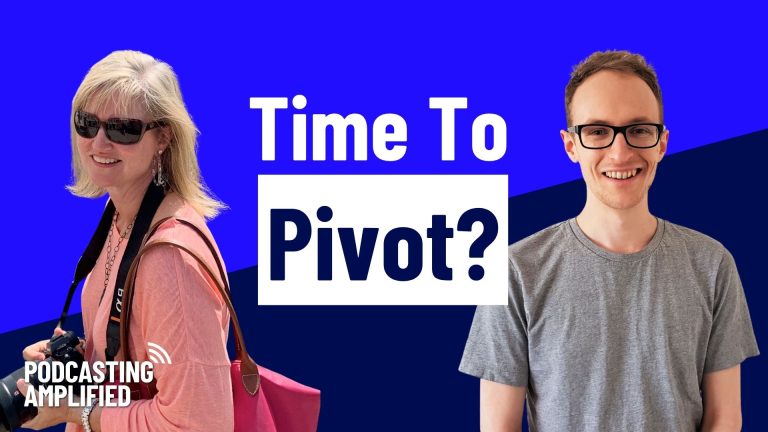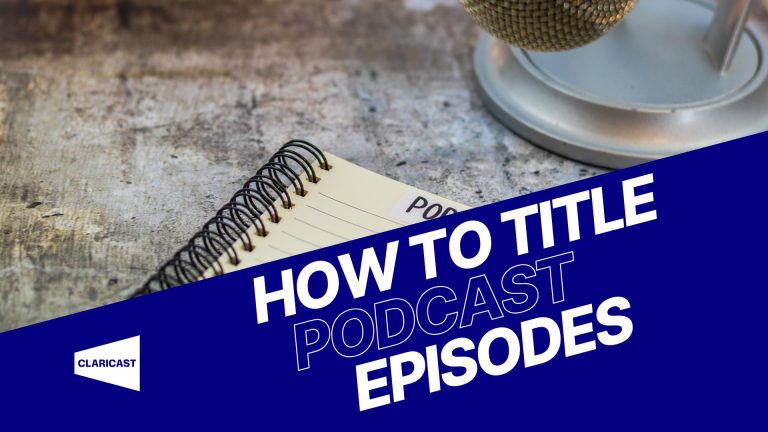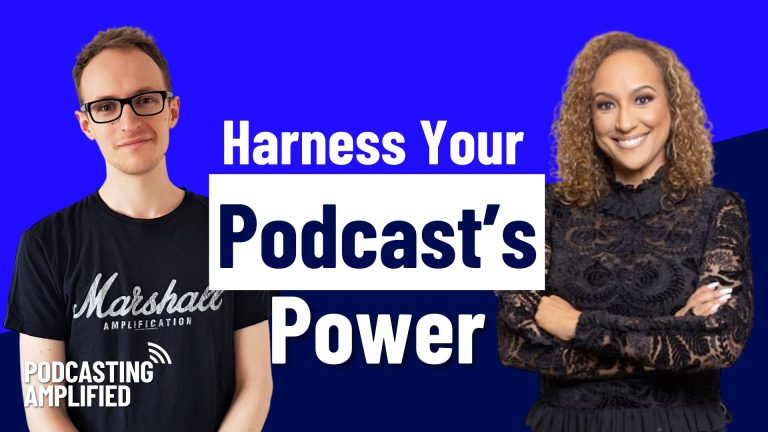As a podcaster, you want as many people as possible to listen. That’s no secret. It’s also no secret that podcast growth can be slow during the first year or two. But ideally, you’ll be seeing some steady podcast growth once you’ve been consistently releasing quality episodes for a while.

There are many causes of slow or no podcast growth. It’s nuanced and can sometimes be difficult to track down. However, we’ve put together 11 reasons that could be preventing your show from growing. Have a read-through and see if any of these resonate with you.
1. You didn’t clearly define your show’s purpose
This is one of the most important things that you can do to ensure that your podcast grows. When you have a clear idea in mind of what you want to achieve, and who your audience is, it’s much easier to decide on the kind of content you create.
You should start by thinking about:
- Who do I want listening? What do they need? How will each episode help them to achieve that?
- What are my goals for this episode or series? What am I trying to achieve with it?
Answers to these questions will help you tailor your episodes to a very specific type of person who will stick around if your content is right for them.
2. You didn’t create an actionable strategy
It’s important to have a plan in place that defines your goals, audience and brand. This can be translated into a content calendar, to keep you consistent week to week.
Your content strategy should be broken down into:
- What type of podcast you will create (the format of your podcast).
- How often you are going to publish episodes – and stick to it.
- Where you will promote this content? Think about which social media platforms your ideal listener hangs out on and stick to it. There’s no point in sporadically posting to whichever place you feel like week to week.
- What kind of companion content will you publish alongside your episodes? Video shorts and text posts that bring value to your audience will help grow your following.
3. Your branding isn’t consistent
If your podcast isn’t growing, one reason could be a lack of consistent branding. A strong brand can help you stand out from other podcasts in your niche, and make it easier for people to find you and understand what you’re offering them.
This consistency helps build trust with listeners and makes it easier for them to stay loyal and recognise you cross-platform.
The most important thing when considering branding is making sure that every aspect of it—from your cover art and logo design to the tone of voice you use in your written content, is on-brand.
This may seem like common sense but many podcasters make mistakes here because they don’t take into account how important consistency is when it comes to building a memorable brand.
4. Not everyone can find you
We’ve mentioned ensuring you’re promoting your episodes on social media platforms that your ideal listener can be found on. But can they find your podcast if they want to listen?
We’ve seen it happen many times where a podcaster has launched their podcast through their podcast host, but they haven’t set up distribution to all of the podcast players.
Even if you’re distributing to the big three (Apple Podcasts, Spotify, YouTube), there are still plenty of potential listeners out there using other platforms like Amazon Music and Deezer.
Take a look at your podcast host and ensure that you’ve set up distribution to every platform that you can.
5. Your episodes are too long
I’m not going to tell you how long your episodes should be. That depends on the format, who your ideal listener is and the type of content. Your episodes should be exactly how long they need to be.
This means that if your interview episodes often include 5 minutes of small talk before the value starts – your episodes are longer than they need to be.
Consider how much time your ideal listener has, too, and try to get insights directly from them regarding when and were they listen. Are they busy professionals that tend to listen on their 30-minute commute? Then 1.5 hour long episodes would probably take up too much of their time.

Your analytics can give you more info here, too. Where do listeners typically drop out?
If you struggle with keeping episodes concise during the recording stage, don’t worry, that’s where editing comes in!
6. You aren’t producing enough content
Podcasts are a medium of consistency. We’ve mentioned ensuring you’re sticking to your podcast schedule, but if that schedule is only one episode per month or quarter, you’re unlikely to see podcast growth.
If you’re not producing enough content, your audience won’t have anything to consume and will move on to other podcasts that are more consistent and regular.
If you’re posting weekly episodes, or even fortnightly, you’ll almost certainly see faster growth than if you’re posting monthly.
7. Your content isn’t focused
If your content isn’t consistently relevant to your ideal listener’s needs, they will look elsewhere.
If you’re hosting a solo or co-hosted podcast, think about the types of content your ideal listener will get the most value from. What questions are they asking? Each episode should have a particular focus.
And if you’re hosting an interview podcast, keep your ideal listener in mind throughout the interview. If things drift off topic, it’s up to you as the interviewer to keep things focused (or edit out irrelevant parts after).
8. Your audio sounds bad
One of the most common mistakes new podcasters make is to overlook audio quality. Even if your content is great, if it’s unpleasant to the ear, your listeners may look elsewhere.
And we’re not just talking about editing here, we’re talking about the tonal quality of your recordings and the overall balance.
Hiring a professional producer is the best way to ensure you’re getting the best out of each episode. However, if you’re starting with poor quality recordings, there’s less that can be done.

It doesn’t have to cost the world for a set-up that’ll get you great results. Grab our free Podcast Kickstart eBook to learn how to get pro-level podcast recordings.
9. Your podcast title needs improvement
The title of your podcast isn’t the be-all and end-all for a successful show. But it certainly matters. It matters for discoverability when a potential listener is searching for a new podcast and to help them know that your show is for them.
The title of your podcast should be unique, memorable and relevant. But finding one that’s available can be a tall order with millions of podcasts already out there.
Find out more about choosing the right name for your podcast here.
10. You aren’t offering anything outside of the podcast
We’ve touched on creating companion content for your podcast. Wherever you’re promoting your podcast, regularly posting other valuable content will give potential listeners a reason to follow you before they take the jump to listen to your podcast.
And then after your listener has listened, do you have anything to offer for them to engage further? This can be a freebie such as a guide or 1-2-1 call. For those engaging with you via comments and reviews is there a way you can facilitate a discussion with them to help them further, and also get feedback on your podcast?
Which brings us onto…
11. You aren’t cultivating relationships with listeners or other podcasters/influencers in your niche
Making genuine, human connections with other people is one of the most essential aspects of growing your podcast (or anything, for that matter).
Whether that’s relationships with listeners who can provide valuable feedback, as we’ve mentioned, or with others within your space.
Guesting on other podcasts is one of the most effective ways to grow your own podcast. Who can you reach out to that might have a crossover of listeners?

There are a lot of ways to create these valuable relationships, but the most important thing is that you’re providing value.
If you don’t have an existing audience, it can be difficult for other podcasters and influencers in your space to trust that they’ll benefit from working with you. Consider what you specifically can provide to their audience. For example, I formed a great relationship with a podcaster within the YouTube niche by offering to provide his audience with audio advice.
Focusing on building relationships with people can speed up your podcast growth. Podcasting doesn’t work without people.
Conclusion
And there you have it! We hope you’ve found some ideas of elements of your podcast that you can focus on to help grow your audience. There are plenty of other aspects to achieving podcast growth. If you’re looking for more ways to improve your podcast, check out our other resources or get in touch.




